Summer Short Story Roundup: Part One
 A veritable torrent of potent heroic fantasy short stories came out of the interwebs this summer. So many, in fact, for the first time ever I have to break the roundup into two parts. This week I’ll tell you about Swords and Sorcery Magazine, Heroic Fantasy Quarterly, Lackington’s, and Cirsova. All together there are twelve stories and three poems (including the nearly six thousand-word first part of an epic poem). Next week I’ll review Grimdark Magazine, Weirdbook, and newcomer, Red Sun.
A veritable torrent of potent heroic fantasy short stories came out of the interwebs this summer. So many, in fact, for the first time ever I have to break the roundup into two parts. This week I’ll tell you about Swords and Sorcery Magazine, Heroic Fantasy Quarterly, Lackington’s, and Cirsova. All together there are twelve stories and three poems (including the nearly six thousand-word first part of an epic poem). Next week I’ll review Grimdark Magazine, Weirdbook, and newcomer, Red Sun.
Swords and Sorcery Magazine #54 kicks off with “The Witch House” by Jamie Lackey. A young girl named Elinor, escaping a forced and bound-to-be loveless marriage, forces herself on the Witch of the Wood as her new apprentice. That’s it. It’s well written, and I’d actually be interested in reading about the characters if the plot went somewhere, but as it stands it’s too insubstantial to merit much notice.
“Time Is a Lady’s Unerring Blade,” by Stephen S. Power, is a nasty piece of work. Erynd, an ex-prisoner, has plotted her revenge against one of the captors who tortured and crippled her.
Anyone can buy a soul. Even the meanest villages have dealers now, and prices remain low, thanks to the border wars five years ago. To buy a specific soul, though, Erynd has to deal with a ghost taker.
Having found her target, Erynd intends to see his soul stripped from him bit by painful bit. Not a lot happens, but there are sufficient hints of a larger context for the story that intrigued me and left me wondering about the story’s larger world and history.
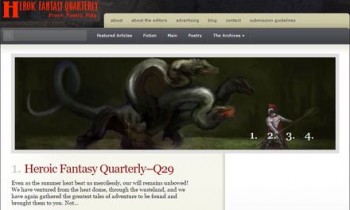
As usual, Heroic Fantasy Quarterly #29 is a wild ride, but this time with more poetry and pictures than ever before. I’m going to hold off on a full review of Cullen Groves’ Homeric poem, “Lethe’s Cup and the White Sword” until it’s complete next issue, but here’s a taste:
Was in the summer, underneath a bright
Blue sky, the pagans came, in corselets dight,
Out from the eastern forests cold and stark
Where Elves still ruled in sunless pine-groves dark;
Was in the summer, underneath a sky
Of blue, the Christian knights went forth to die,
The paladins of Empire, proud in war,
Against the pagans rode, returned no more.
I love Adrian Simmons’ dedication to heroic poetry, and I applaud the publication for such a daring undertaking in this day and age.
In Matthew Wuertz’s “Shadows in Sakamura,” wandering warriors Tsukiko and Katsu share a strange, bifurcated existence. By day, Tsukiko appears a normal woman but with a too-large shadow. At nightfall, Katsu appears and Tsukiko becomes his shadow. Even as shadows, the duo are able to effect the physical world, as a gang of thieves learns:
Tsukiko dropped her weapon in pain. In front of her, the man with the knife thrust toward her face.
His movement stopped short. “What?” he asked.
Tsukiko’s shadow had repositioned itself between her and the young man. It slid backward, and the young man followed the movement like a marionette. Under the shadow’s guidance, he took a side step and swung the blade into the man who’d struck Tsukiko.
After this episode Tsukiko and Katsu enter a town recently struck by a plague which carried off many children. While the townspeople connect their lassitude to that loss, the two warriors suspect something odder is afoot. With a bit of mystery and some swordplay, the story heads toward a satisfying conclusion.
“Racing the Headsman” is Andrew Knighton’s wild tale of nautical combat in a very alternate history. The daring ship captain, Sir Henry Torrent, is trying to get King Charles II to safety in France on his ship, Bedevere. Unfortunately, escape will not be as easy as hoped for:
‘If I may, sir.’ He poured for the King, then leaned in close to Sir Henry, whispering as he filled his glass. ‘That sail’s gaining on us, sir.’
‘Don’t be ridiculous,’ Sir Henry hissed. ‘There’s only one ship that can match us, and she’s in the Indies.’
‘Pardon me, sir, but she ain’t.’ Pound glanced nervously at their guest. ‘Full rig, sleek frame, and she’s flying the red flag. With who’s on board, I don’t reckon it for coincidence.’
Sir Henry snatched the telescope and strode to the aft rail, peering out over the ocean. Sure enough, there was the same ship, closer now, flying the red pennant that signaled deadly pursuit, with no quarter asked and none given. If that and her distinctive modern rig weren’t enough, the white dots of skulls lined the fore rail, a boast and a warning to those who crossed the Commonwealth. It sickened Sir Henry to see the mortal remains of good men defiled in this way.
‘Damn my eyes, but you’re right,’ he exclaimed. ‘It’s the Headsman, and she’s after us.’
The King jerked to his feet, spraying breadcrumbs in alarm.
‘Headsman?’ he shrieked.
‘Be calm, your majesty.’ Sir Henry hurried to him, hands raised in placation. ‘It’s just a ship.’
‘Admiral Caldsby’s ship,’ Pound said.
The King trembled with fresh alarm, as fearful as a landsman in a storm. Clearly they had threatened him with Ninetail Caldsby as well as the block.
With references to much of the world being submerged by a great flood, Danish cannibals, and magical communications devices called Black Letters, this tale was right up my alley.
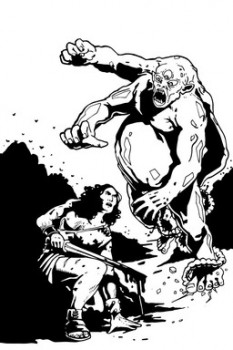
Most times, when a work is called scatalogical, the first definition from Merriam-Webster is the one the speaker has in mind: interest in or treatment of obscene matters especially in literature. Sometimes, though, the second definition is more apt: the biologically oriented study of excrement. The latter is most definitely the one to keep in mind before reading HFQ editor, James Frederick William Rowe’s “Spatha Stercae.” Just for those not conversant (like myself) in Latin, the title translates as “shit sword.”
An utterly vile giant, Vorax the gluttonous, descended from the mountains to kill and devour the Veirans. In an act of utter contempt, he built a tower out of his excrement, calling it the Propugnaculum Priorum Hominum—the Tower of Former Men.
The Veirans make numerous efforts to defeat the giant, but each fails. Finally, they enter a sort of detente, offering up all their lawbreakers to Vorax to stave off him just rampaging through their ranks. One day, while the monster is off scouring the hilltops for careless herdsmen, the unfortunate cattle-thief Torius is to be left, chained and defenseless on his disgusting doorstep. The prisoner convinces his guards to cut his bonds and let him at least have a chance. Seeing only one place to hide, Torius climbs headfirst into Vorax’s disgusting tower, where he readies himself for the fight to come. Simultaneously funny and stomach-churning, this one’s a real blast.
The issue closes with two poems. The first is “The Persuaders” by Colleen Anderson. The second, “Wench,” by Scott T. Hutchison. I don’t want to risk giving anything away, so I’ll just say both are good, short, and you should read them.
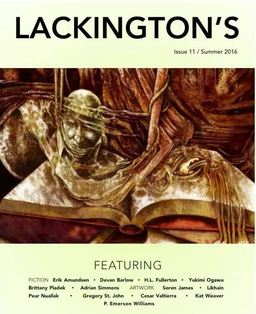 Before diving into the deeps of Cirsova #2, I’m going to take a quick detour to the north, to Canada and the magazine Lackington’s. I’d never heard of it until Adrian Simmons dropped me a line letting me know he had a story in the present issue, #16. Overall it looks pretty good, but for this roundup, I’ll just take a look at Simmon’s brutal tale of Bronze Age slaughter, “How I Came to Be Raised by Balniwan the Fool.”
Before diving into the deeps of Cirsova #2, I’m going to take a quick detour to the north, to Canada and the magazine Lackington’s. I’d never heard of it until Adrian Simmons dropped me a line letting me know he had a story in the present issue, #16. Overall it looks pretty good, but for this roundup, I’ll just take a look at Simmon’s brutal tale of Bronze Age slaughter, “How I Came to Be Raised by Balniwan the Fool.”
From the story’s child narrator we learn that:
There is no place more blessed than the five hills of Father’s clan. The very gods led Grandfather here, the very spirits welcomed us. Envy and hatred followed us, and Father taught us always to be wary and look for signs that the weak and lazy were thieving from us. And I hear the men coming, on the very slope of the most holy hill, and run back up through the woods and tell Father.
The world below the hilltops is changing. Civilization is advancing and power is being consolidated under several chieftains who also keep the region’s enemy, the Tulhal, at bay. Now, in exchange for that protection, the chieftains want the the hill clans to acknowledge their authority. The narrator’s father, Alebeg, is unwilling to change and ready to defend his family and possessions, but the messenger from the chieftains is equally adamant in his demands. And he has a magic sword.
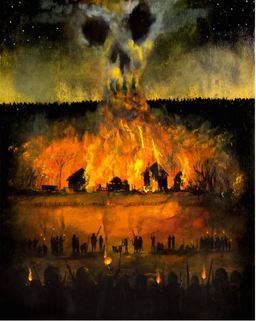
I’m not sure how to read this story. Is the refusal of the hill clan to welcome refugees, and their bunker-mentality an allegory of contemporary events? How true are the claims of the chieftains’ messengers, and are they really offering anything of value to the clan? With an open-ended conclusion, Simmons keeps you wondering long after the story’s done.
And now we come to Cirsova. Last we saw them, with Issue #1 back in April, I wrote “If this is what the first issue looks like, I expect future ones will blow me away.” Having just plowed through the 108 pages of #2, count me blown away.
One of the ongoing conversations about writing these days is the place of narrative storytelling. Personally, I’m for more of it, and it’s clearly something editor P. Alexander favors as well. If you prefer stories like tone poems, or with deep introspection, this is probably not the publication for you. Action, adventure, and vivid scene-setting are the hallmarks of every story.
Bringing on the big guns, Issue #2 kicks off with “The Sealed City” by Adrian Cole. I’m a fan of Cole’s storytelling, and this post-apocalyptic planetary adventure starring a spacefaring witch hunter did not disappoint. Bat-like monters, evil cultists, a shimmering portal to demonic regions of outer space, it’s got ’em all. Very, very good stuff. The intro informs the reader it’s part of Cole’s early Dream Lords trilogy, so I guess I need to track those down.
Demon-dogs and a supernatural war feature in Brian K. Lowe’s fun “Hoskin’s War.” Skulking at the rear of an English column in hopes of picking off stragglers in such a way as to make the British think their Iroquois allies have turned on them, Daniel Hoskins sees something horrible:
Two black shapes exploded out of the trees on the opposite side of the trail, blurs that looked like dogs, like wolves, like something in between but larger than either. Two redcoats talking to a civilian in buckskins died under their charge before they could raise muskets. A third brought his weapon to bear even as he went down; there was a loud report as he fired point-blank — but the beast did not even hesitate before ripping out his throat with a shower of blood. The women had only now begun to scream, the other men to react, when a band of howling braves, emblazoned as for war, swarmed from the trees on the beasts’ heels.
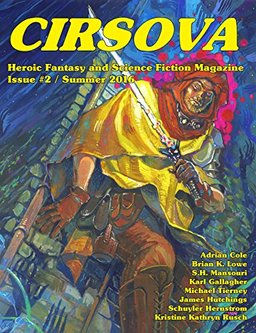 When the monsters finish their bloody work, they take off into the forest with several women prisoners. Hoskins, his men, and a surprisingly knowledgeable survivor, John Lampe, head off after them in order to effect a rescue. Things only get stranger and more dangerous from there.
When the monsters finish their bloody work, they take off into the forest with several women prisoners. Hoskins, his men, and a surprisingly knowledgeable survivor, John Lampe, head off after them in order to effect a rescue. Things only get stranger and more dangerous from there.
Karl Gallagher’s “Squire Errant” explores what happens when the knight brought in to kill the cattle-swallowing, man-eating beast devastating a small town gets killed in the first combat. In this story, his squire pulls a Magnificent Seven and turns the townspeople into a militia he hopes can stand up to the beast. It’s a nice, straightforward story of swords and monster-killing.
Horror moves to the forefront in S.H. Mansouri’s dark Nordic story, “The Water Walks Tonight.” The fishing catch of the town Glera Syori has been devastated as punishment for the sins of several citizens. At the direction of the seiðr (shaman), the transgressors are sent to face supernatural judgment on the island of Volva at the hands its undead inhabitants, the draugr. Good and creepy, with a sharp ending.
Loss of memory and evil forces plague an underwater photographer in Michael Tierney’s “Shark Fighter.” A story of revenge and murder, I found my attention wandering a little while reading this. Still, it’s well written and there is a powerful emotional punch at its core.
“My Name is John Carter (Part 2)” by James Hutchings continues the poetic interpretation of Edgar Rice Burroughs’ archetypal hero begun in Cirsova #1. This time around, he’s starting to feel a little less despondent.
Hope had left me — but then it came calling again with the name Dejah Thoris one day.
The concluding work in this issue is Schuyler Hernstrom’s cynically comic novella, “Images of the Goddess.” Eighteen-year-old monk, Plom, has spent most of his life being lowered in a basket from his mountaintop monastery to gather excrement used to make dye. Now he, an utter and complete innocent, has been sent out into the wide world to recover a tome with images of the great Goddess they worship:
“The sacred folio lays 150 leagues to the south, across the Plains of Ash and at the heart of the Ikzak Jungles. It rests deep within the heart of an ancient vessel, a metal monster from the age when man traveled space by bending time. The journey will be long and hazardous. My deepest regret is that I am too old to seek this treasure myself. The robustness of youth is required.”
Plom quickly acquires companions and faces danger and death. A wizard and a barbarian maid get simmered together with an insect-man killer, a giant, and a robot brain for a pot of hearty adventure. It’s like a story by a slightly cruder Jack Vance. I had never encounter Hernstrom before Cirsova #1 and the very good “The Gift of the Ob-Men.” With this one, he has definitely been enrolled on my list of must-read authors.
Whew, that’s a lot of story-reading this past week, with nearly as much in the week ahead. Fortunately, as you can see, it was pretty enjoyable. Now, unlike Swords and Sorcery Magazine and Heroic Fantasy Quarterly, which you can read for free, you do have pay for Cirsova. At $2.99, though, it’s quite a bargain. Heck, going back in time to 1966, the year I was born, that’s the equivalent of a mere 40 cents. So go out there people, and take the time to read some downright cool stuff.
Fletcher Vredenburgh reviews here at Black Gate most Tuesday mornings and at his own site, Swords & Sorcery: A Blog when his muse hits him. You can read the last short story roundup here.
Thanks for the plug, and glad you enjoyed issue 2! We’re hoping to have more new Dream Lords in the future.
I can say that the Dream Lord books are absolutely worth checking out. I had my doubts, because they really did have some pretty lousy covers (in fact, I grabbed them at a flea market because they had such ridiculous covers).
Before he decided to brush off his old notes and start writing new Dream Lord stories, Cole told me a bit about the covers here:https://cirsova.wordpress.com/2016/02/29/the-dream-lords-by-adrian-cole/
The original trilogy captures a lot of that new wave weird, but don’t have the nihilism of series like Amber or Elric. The hero is cut more from the Burroughsian cloth.
If anyone is interested in checking out Cirsova, our Kickstarter for issues 3 & 4 is live now; all backers will receive a digital copy of issue 3, and $3 will get you both issues.
[…] Full Article here […]
Thanks for the review. I’m glad you enjoyed the story!
Thanks for the review of both HFQ and my story at Lackington’s! “Lethe’s Cup and the White Sword” was a rare thing and we felt we had to bring it to the world.
Your all welcome! A real bumper crop this month.